




Medicare Advantage Plans New Hampshire 2026
Wondering about the potential Medicare Advantage plans in New Hampshire
Key Takeaways
- New Hampshire offers various types of Medicare Advantage plans, including HMO, PPO, and Special Needs Plans, each with different features and benefits.
- Some Medicare Advantage Plans in New Hampshire may offer additional benefits such as, dental, hearing, and vision care for comprehensive coverage.
- Certain plans may offer comprehensive covered services, as well as potentially lower out-of-pocket costs compared to Original Medicare, likely enhancing financial protection for members.
Compare Plans in One Step!
Enter Zip Code
Understanding New Hampshire Medicare Advantage Plans 2026

Medicare Advantage plans, also known as Medicare Part C, could act as an alternative to Original Medicare that might offer additional benefits and services. These plans are provided by private insurance companies and must cover all the services that Original Medicare does, but some might include extra benefits like dental, vision, and hearing coverage.
Members should review both Medicare Advantage and Supplement plans to find the best coverage.
Types of New Hampshire Medicare Advantage Plans Available
New Hampshire will likely offer a variety of Medicare Advantage plans designed to cater to different healthcare needs and preferences. These include Health Maintenance Organization (HMO) plans, Preferred Provider Organization (PPO) plans, and Special Needs Plans (SNPs). Each of these plans offers unique features and plan benefits.
HMO Plans
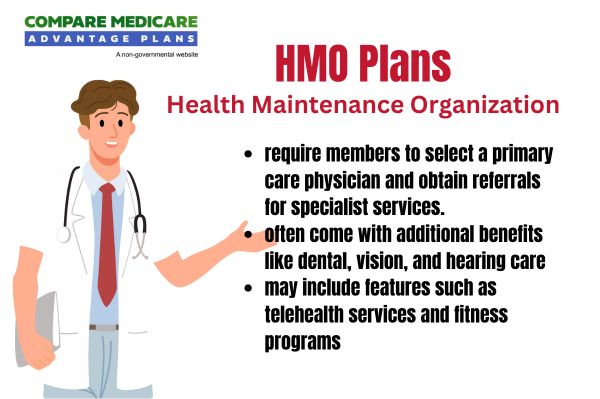
Health Maintenance Organization (HMO) plans may be a popular choice among Medicare beneficiaries in New Hampshire. These plans typically require members to choose a primary care physician who coordinates their healthcare and provides referrals for specialist services. HMO plans use a network of doctors and hospitals, potentially providing lower costs compared to other plans. Some HMO plans may also include additional benefits like dental, vision, and hearing care.
However, there might be some trade-offs. Members of HMO plans must primarily use network providers, which may limit their out-of-network care options. However, comprehensive coverage and potential cost savings could make HMO plans an attractive option for many seniors.
PPO Plans
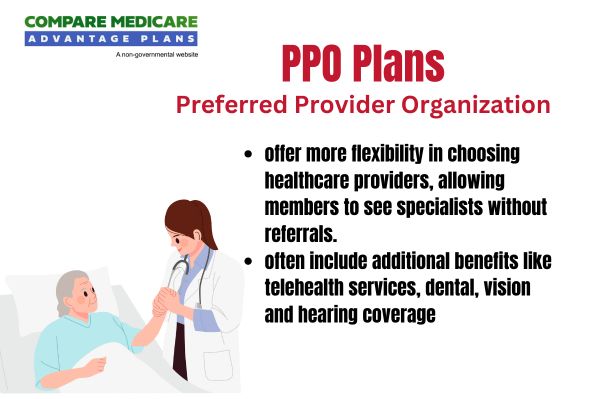
Preferred Provider Organization (PPO) plans offer greater flexibility compared to HMO plans. PPO plans allow members to visit any healthcare provider without a referral, though using in-network providers could potentially reduce costs. This flexibility will likely suit those who want the freedom to choose their doctors and specialists without needing a referral.
However, this flexibility comes at a cost. PPO plans may have higher premiums and out-of-pocket costs compared to HMO plans.
Special Needs Plans (SNPs)
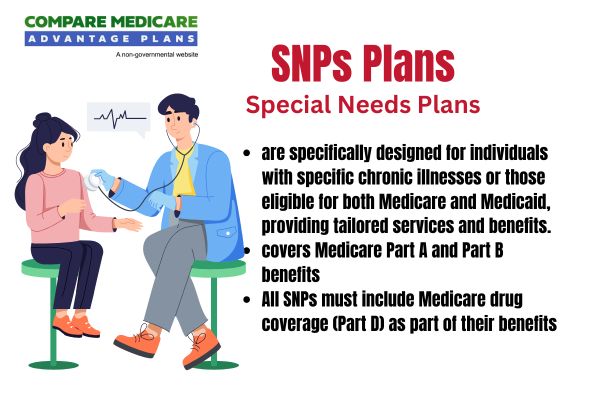
Special Needs Plans (SNPs) are tailored for specific groups of individuals, such as those who are chronically ill, providing specialized care and resources. Designed to meet unique healthcare needs, SNPs likely ensure members receive appropriate care and support. There may be several SNP plans available, such as plans for individuals with chronic conditions (C-SNPs), those eligible for both Medicare and Medicaid (D-SNPs), and those in skilled nursing facilities (I-SNPs).
SNPs could provide a range of benefits tailored to the specific needs of their members, including specialized care coordination and access to a network of providers experienced in managing specific health conditions. For those with unique healthcare needs, SNPs could offer a more personalized and supportive healthcare experience.
Overview of New Hampshire Medicare Advantage Plans 2026
Understanding the differences between Medicare Advantage and Medicare Supplement plans could help New Hampshire seniors choose the right coverage.
Potential Services and Benefits

Medicare Advantage plans in New Hampshire will likely cover a wide range of services and benefits, including essential medical services like hospital stays and outpatient care. Some plans may incorporate prescription drug coverage, dental, vision, and hearing care, which Original Medicare typically does not cover.
These potential benefits will likely address diverse health needs, possibly ensuring comprehensive care and support.
Possible Benefits of New Hampshire Medicare Advantage Plans 2026
Some Medicare Advantage plans in New Hampshire may offer an out-of-pocket maximum. This potential cap might offer greater financial protection and potentially reduce the financial burden of healthcare costs for seniors.
These potential offerings could make Medicare Advantage plans an appealing option for those seeking comprehensive and cost-effective healthcare coverage.
Additional Health Services
Certain Medicare Advantage plans in New Hampshire may provide additional health services that could go beyond standard medical coverage, such as dental, vision, and hearing coverage.
Dental and vision services might cover annual oral exams, cleanings, X-rays, and treatments like fillings and extractions. Vision benefits may include annual eye exams and assistance with purchasing eyeglasses or contact lenses.
Hearing services, such as annual hearing exams and coverage for hearing aids, may further enhance these plans’ comprehensive nature.
Enrollment Process for New Hampshire Medicare Advantage Plans 2026
Careful consideration and timely action are required for enrolling in a Medicare Advantage plan in New Hampshire. With several plan options available, seniors should review their choices when selecting a plan.
The enrollment process includes several key periods, which will be explored in the following subsections.
When to Enroll
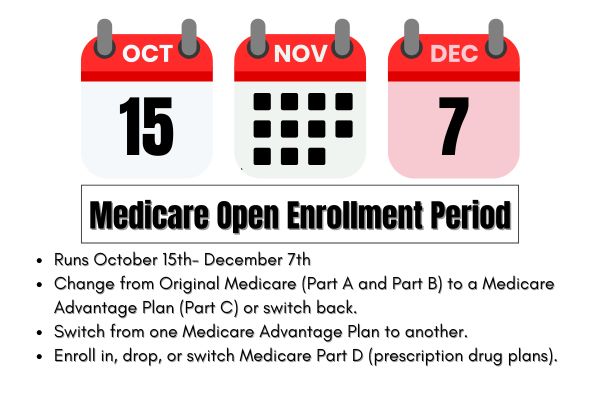
The enrollment period for New Hampshire Medicare Advantage plans typically runs from October 15 to December 7 each year, known as the Annual Enrollment Period (AEP), allowing beneficiaries to review and change their plans.
Eligible individuals can also enroll during the Medicare Advantage Open Enrollment Period from January 1 to March 31. Special Enrollment Periods may be available for those experiencing certain life events, such as moving or losing other health coverage. Knowing these enrollment periods likely ensures continuous and adequate healthcare coverage.
Different Enrollment Periods
The enrollment periods for Medicare Advantage plans include the Annual Enrollment Period (AEP), running from October 15 to December 7 each year, allowing enrollees to join, switch, or drop their plans effectively the following January.
The Integrated Care SEP allows fully dually eligible individuals to enroll in or switch to specific integrated Dual Eligible Special Needs Plans (D-SNPs) monthly.
OEP, AEP, and Special Enrollment
The Open Enrollment Period (OEP) allows beneficiaries to make one change to their Medicare Advantage or Part D plans each year. It occurs annually from January 1 to March 31, allowing members to switch plans or revert to Original Medicare.
The Annual Enrollment Period (AEP) runs from October 15 to December 7, allowing individuals to enroll in or switch their Medicare plans.
Special Enrollment Periods (SEP) can occur due to specific life events, allowing individuals to change their Medicare plans outside standard enrollment periods. During the SEP, individuals may switch plans if they move out of their plan’s service area or lose other health coverage.
Possible Costs Associated with New Hampshire Medicare Advantage Plans 2026

The potential costs associated with Medicare Advantage plans in New Hampshire may vary widely based on the specific plan chosen. Some plans might offer competitive pricing compared to Original Medicare, potentially resulting in lower overall out-of-pocket expenses.
The following subsections will explore the specific costs related to premiums, co-pays, and out-of-pocket maximums.
Premiums and Co-Pays
Premiums and co-pays for Medicare Advantage plans may vary significantly based on the specific plan and coverage. Some plans could potentially reduce premiums and copays, likely making them accessible to a wide range of beneficiaries.
In addition to standard medical services, some Medicare Advantage plans might include additional benefits like dental, vision, and hearing coverage.
Out-of-Pocket Maximums
Certain Medicare Advantage plans may provide an out-of-pocket maximum. This potential cap could limit the total amount members spend on healthcare services in a year, possibly providing financial protection against high medical costs. These plans may have varying out-of-pocket maximums depending on the specific plan chosen, potentially offering lower limits, possibly adding financial security for beneficiaries.
Members should understand the specific coverage details of each plan to manage healthcare expenses effectively. Medicare Advantage plans will likely be designed to limit overall healthcare spending, possibly ensuring beneficiaries are not overwhelmed by unexpected costs.
Covered Services and Potential Benefits
Medicare Advantage plans in New Hampshire will likely cover a broad range of medical services, from hospital stays to outpatient care. Some plans may even offer additional coverage for dental, vision, and hearing services.
How to Qualify for New Hampshire Medicare Advantage Plans 2026
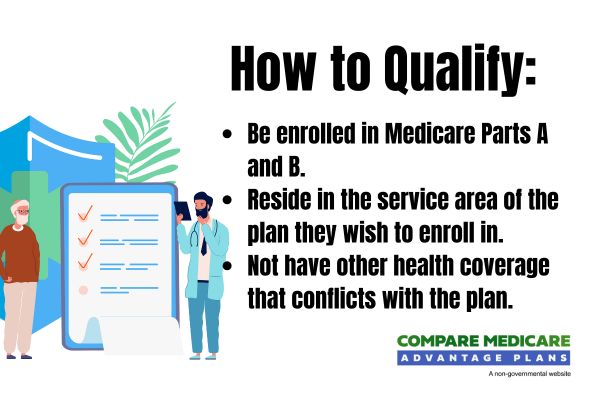
To qualify for Medicare Advantage plans in New Hampshire, individuals must be enrolled in Medicare Part A and Part B and reside in the service area of the chosen plan. Eligibility requirements ensure beneficiaries receive adequate coverage tailored to their specific healthcare needs.
Seniors should review any changes to their current Medicare Advantage plans. Members should receive notification letters from their Medicare Advantage providers of changes and important deadlines for selecting new coverage.
This proactive approach could help beneficiaries avoid reverting to Original Medicare, likely ensuring continuous and comprehensive healthcare coverage.
Contracted Network and Access to Care
Access to a broad network of healthcare providers will likely be another advantage of Medicare Advantage plans. These plans will likely partner with a wide range of healthcare providers, giving members access to numerous hospitals, doctors, and specialists within their network. This extensive network could potentially ensure that beneficiaries receive the care they need without facing significant out-of-pocket expenses when using in-network providers.
Members may be encouraged to use in-network providers to optimize their benefits and potentially minimize costs. This website makes it easy for members to check if their preferred doctors and healthcare facilities participate in the network. This convenience can help beneficiaries navigate their healthcare options and make informed decisions about their care.
Comparing New Hampshire Medicare Advantage Plans 2026 to Original Medicare
Comparing Medicare Advantage plans to Original Medicare may be essential for understanding the differences in coverage and costs. While some Medicare Advantage plans may offer additional benefits and services, they might come with varying out-of-pocket costs.
Understanding these differences could help beneficiaries choose the plan that best meets their healthcare needs.
Coverage Differences
One of the main differences between Medicare Advantage and Original Medicare will likely be the additional benefits that might be offered in some Medicare Advantage plans. Certain plans might include services such as dental, vision, and hearing care, which are not typically covered by Original Medicare.
Medicare Supplement plans, on the other hand, could offer broader access to healthcare providers without network limitations. This potential flexibility may be advantageous for beneficiaries who prefer to choose their doctors and specialists without restrictions. However, certain Medicare Advantage plans may also incorporate prescription drug coverage, possibly offering a comprehensive healthcare solution.
Cost Comparisons
Cost will likely be a significant factor when comparing Medicare Advantage plans to Original Medicare. Medicare Advantage plans may offer a range of premiums, copays, and out-of-pocket costs, depending on the specific coverage and benefits included.
Understanding these potential cost differences could be crucial for beneficiaries to make informed decisions about their healthcare coverage and possibly avoid unexpected expenses.
Emergencies and Referrals

In emergency situations, out-of-network providers are not obliged to treat Medicare Advantage members unless specified by the plan. However, during declared public health emergencies, Medicare members can access their benefits without needing referrals and enjoy reduced out-of-network costs. This flexibility likely ensures that beneficiaries receive necessary care during critical times.
Summary
Navigating the various options for Medicare Advantage plans in New Hampshire
As the landscape of Medicare Advantage plans changes, it’s essential to review your options carefully, consider your healthcare needs, and choose a plan that could offer comprehensive coverage and financial protection. Stay proactive, stay informed, and ensure you make the best choices for your healthcare in the coming year.
Frequently Asked Questions
→ How do I know if I need to switch my Medicare Advantage plan?
You should switch your Medicare Advantage plan if it is discontinued, as you’ll need a new one to avoid reverting to Original Medicare. Keep an eye out for notification letters from your provider detailing important information and deadlines.
→ What additional benefits could Medicare Advantage plans offer?
Some Medicare Advantage plans may offer additional benefits like dental, vision, and hearing coverage, which are not usually included in Original Medicare. These potential benefits might make Medicare Advantage an appealing choice for comprehensive healthcare coverage.
→ When is the Annual Enrollment Period (AEP) for Medicare Advantage plans?
The Annual Enrollment Period (AEP) for Medicare Advantage plans is from October 15 to December 7 each year, allowing beneficiaries to review and modify their plans.
→ What is the difference between HMO and PPO plans?
HMO plans require you to use a network of providers and obtain referrals for specialists, while PPO plans offer more flexibility by allowing you to see any provider without a referral, albeit with lower costs if you use in-network services.

ZRN Health & Financial Services, LLC, a Texas limited liability company



